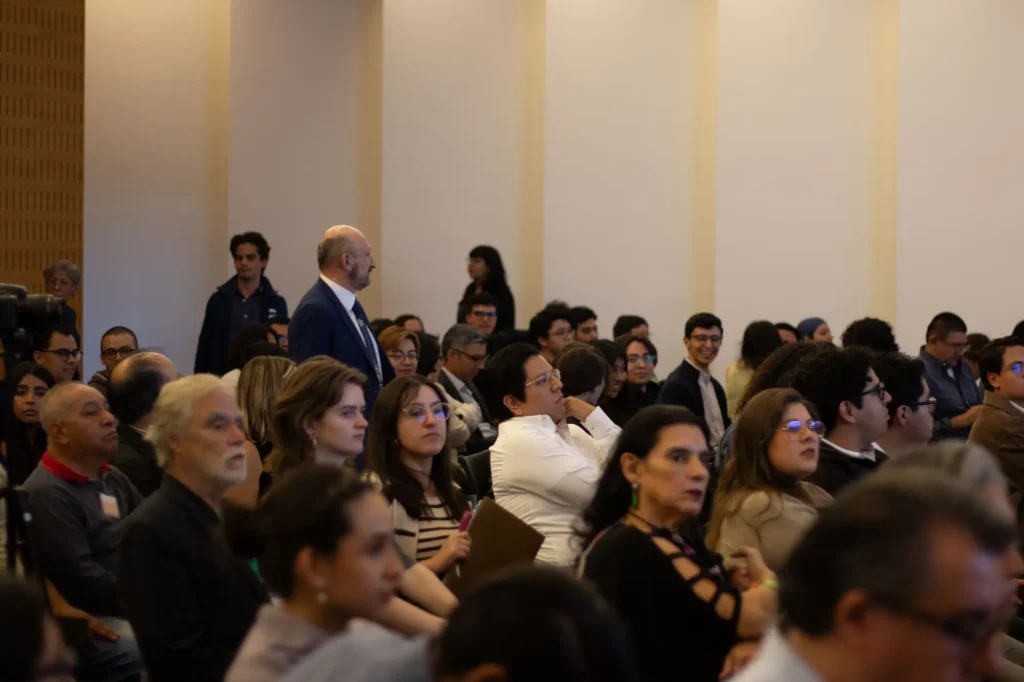Democracies around the world are in danger. This was the conclusion reached by researchers from Stanford University during an event held at El Colegio de México in Mexico City.
Dr. Adam Przeworski and Dr. Beatriz Magaloni warned of a decline in democratic institutions and values worldwide, especially in the Americas. Dictatorships like that of Nicolás Maduro, they said, have marked the contemporary history of Latin America, while the actions of the current US president threaten the advent of American authoritarianism.

Dr. Adam Przeworski during the conference Authoritarianism and Democracy Half a Century After the Start of the Third Wave held at the Colegio de México, Mexico, October 30, 2025. Hans Leguízamo/MxPA.
The event, titled “Authoritarianism and Democracy Half a Century After the Start of the Third Wave,” took place on October 30 and brought together researchers, teachers, and students to discuss threats to democracy in various countries around the globe.
During the event, Dr. Adam Przeworski shared an alarming fact: the average lifespan of democracies around the world is about 20 to 25 years.
“Very few have survived more than 100 years, and the only one that has survived more than 200 is the United States. This shows us that democracies are vulnerable,” he emphasized.

Students and academics gathered at the Colegio de México for the conference Authoritarianism and Democracy Half a Century After the Start of the Third Wave held at the Colegio de México, Mexico, October 30, 2025. Hans Leguízamo/MxPA.
Experts commented that this was the reason why democracy in the United States was thought to be invulnerable, and with a 200-year history of uninterrupted democracy, the land of the free now sees its institutions threatened by a president who, in the opinion of these researchers, is shaping up to be an authoritarian leader.
For her part, Dr. Beatriz Magaloni highlighted the case of El Salvador, which she considers a watershed moment for the region: “I have been doing fieldwork all summer (in El Salvador) and I have no doubt that the regime is profoundly dictatorial.”

Dr. Beatriz Magaloni during the conference Authoritarianism and Democracy Half a Century After the Start of the Third Wave, held at the Colegio de México, Mexico, October 30, 2025. Hans Leguízamo/MxPA.
Dr. Beatriz’s research indicates that the transfer of power to Nayib Bukele in El Salvador stems from the population’s dissatisfaction with insecurity and violence. In this context of widespread insecurity, she explained, people accept the concentration of power in a single leader in the hope that he will address their most urgent needs.
The results of this professor’s research also highlight the consequences of a dictatorship for the most vulnerable people. In El Salvador, the outcome of what the doctor calls “punitive authoritarianism” is manifested in the mass incarceration of citizens under the pretext of combating gangs.
The lack of the right to a fair trial also means that in this country, “innocent people are imprisoned without being able to prove their innocence,” noted Dr. Beatriz Magaloni.
The conference also served as the launch of the Democracy Action Lab, a space at Stanford University that combines research and strategies to defend and revitalize democracy.
Related: New York Mayor-Elect Zohran Mamdani Praises Claudia Sheinbaum as a Model of Progressive Leadership